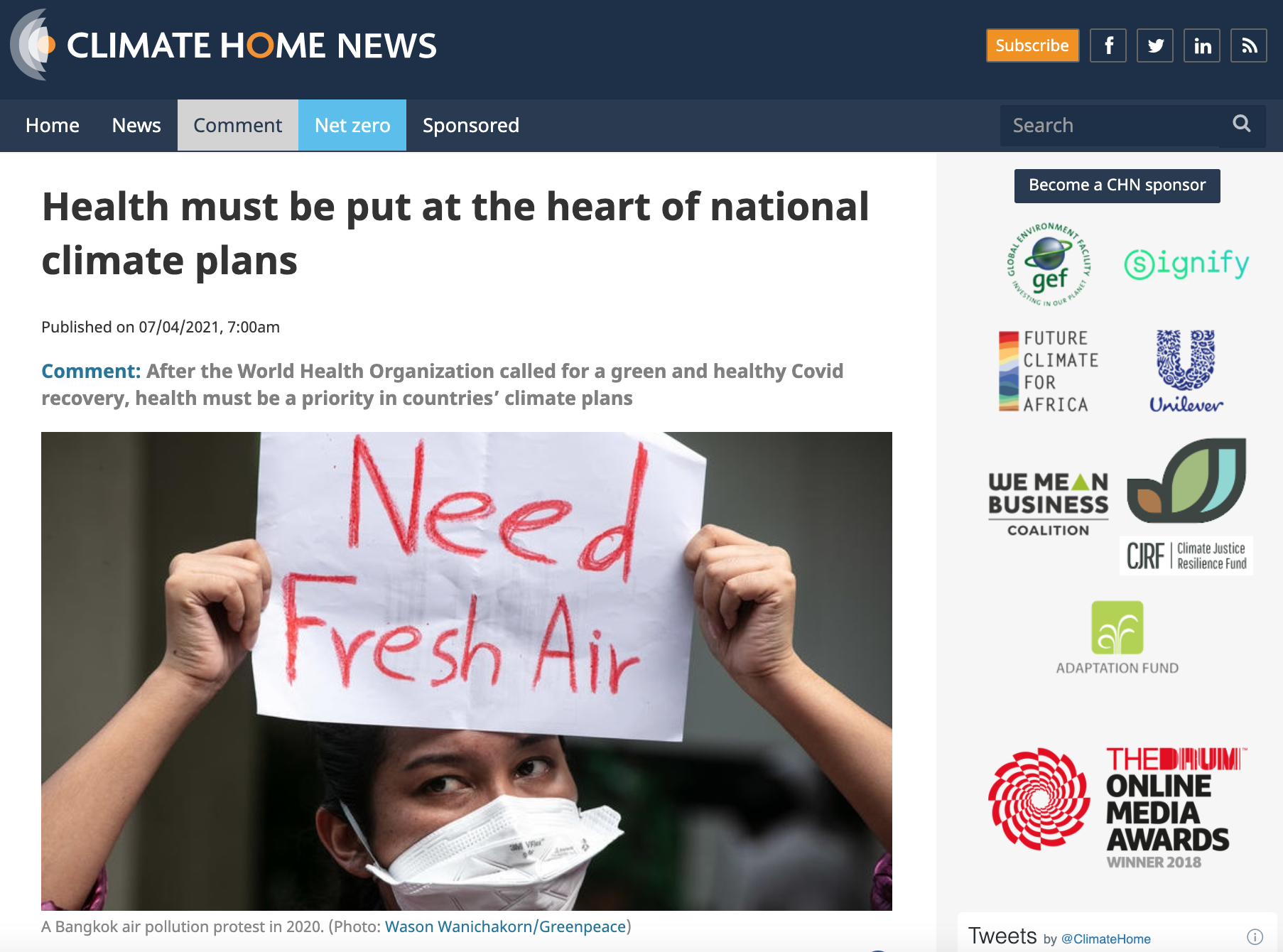First published on Climate Home News, 7 April 2021
Jeni Miller
For seven decades, the World Health Organization has used April 7th, World Health Day to bring important health issues to public attention. This year, as the world battles the Covid-19 pandemic, the theme is “building a fairer, healthier world for everyone”.
With November’s COP26 fast approaching, this World Health Day message should inspire governments to both take responsibility and to seize the opportunity to commit to ambitious emissions reductions targets, aligned with the Paris Agreement, in their Nationally Determined Contributions (NDCs), and to make health and equity a central focus of national climate policies.
Right now, many countries are in the process of reviewing their climate commitments and are soon expected to announce updates. They can, and must put health front and centre. The United States, having just re-entered the Paris Agreement, will host a Climate Leaders’ Summit on Earth Day, April 22. To successfully generate international momentum during this summit, the US must step forward with a strong commitment of its own; this is a chance for President Biden to show real climate leadership and recognition of the lessons learned during the pandemic, by fully integrating health into the US Nationally Determined Contribution. Other world leaders must not wait around for US leadership- they must step up their ambitions – and action.
To say there is much to do would be an understatement. A recent UN report found that by 2030, the total GHG emissions of 75 countries responsible for 30% of global emissions are projected to be less than 1% lower than in 2010, falling dangerously short of the 45% reduction in emissions required during this time period if the goal of the Paris Agreement is to be met. The countries responsible for 70% of global emissions are yet to go public with updates to their national climate commitments.
Prolonging this inaction – or taking action that falls far short of what is needed — furthers the risk of endangering both the health of the planet, and of us, the people who depend on its wellbeing for our own health.
In 2020, The World Health Organization and associations representing over 40 million health professionals have called for a “green and healthy” COVID-19 recovery. The pandemic has taught that health must be part and parcel of every government policy – including climate policy. A new multinational study of doctors’ and nurses’ understanding of and views on climate change, which will be published on April 7th by The Lancet Planetary Health (link will go live at 2330 GMT on April 7th), found that a vast majority of survey respondents believe the health community should have a say in pushing for national policies that will protect health by meeting the targets of the Paris Agreement.
Healthy populations are a prerequisite for economic recovery, while strong health systems are essential to increase resilience to future crises, such as changing infectious disease patterns and extreme weather events.
This is why our organisation, the Global Climate and Health Alliance, plans to release a scorecard by mid-year, to rank progress of countries towards the inclusion of health within national climate commitments – or “Healthy NDCs”, as they prepare for COP26.
Win-win solutions that both protect health and mitigate climate change have never been more relevant than at this moment of economic fragility. Economic well-being is essential to human health; societies that are more economically equitable — where there is less disparity between the wealthiest and the least wealthy — have better health outcomes for all of their citizens. Greater economic equity brings benefits to everyone’s health.
The health impacts of economic disparity have been laid bare by the pandemic. And our most impoverished communities, and low income countries, also suffer disproportionately from climate change impacts.
A country with a healthy national climate action commitment will recognise the impacts of climate change on health, and the need for health and equity to be integrated into adaptation planning. It will set out interventions that reduce emissions and also offer immediate and local health benefits, such as improved air quality, healthier diets, and increased physical activity. Such a country must be ambitious enough to do its fair share to limit warming to 1.5C. Health benefits of climate solutions will help offset the economic costs of climate mitigation and adaptation. Governments can protect their citizens’ health – and prevent millions of untimely deaths – by embedding health in national climate policies.
A paltry 1% reduction in GHG emissions would spell disaster for citizens of every country. Governments must seize this moment to urgently reorient current trajectories for the sake of people worldwide, and for generations to come.
The Global Climate and Health Alliance is calling on governments to ensure that national climate action commitments include:
- Ambitious commitments for greenhouse gas emissions reductions, aligned with the Paris Agreement target of 1.5C
- Measures to reduce greenhouse gas emissions that mitigate climate change and also maximise health benefits – such as by improving air quality, and supporting walking and cycling and public transport use.
- Calculation of the associated health costs savings, with health impact assessments that demonstrate these health and economic gains.
- Adaptation strategies which incorporate health and commit investments to build climate smart and resilient healthcare and public health systems.
- Within and beyond NDCs, Covid-19 recovery investments must align with healthy national climate action/commitments, to protect people, the planet and economies, securing a healthy and sustainable future.
Dr Jeni Miller is the Executive Director of the Global Climate and Health Alliance, a coalition of 70 health professional and health civil society organizations from around the world.


